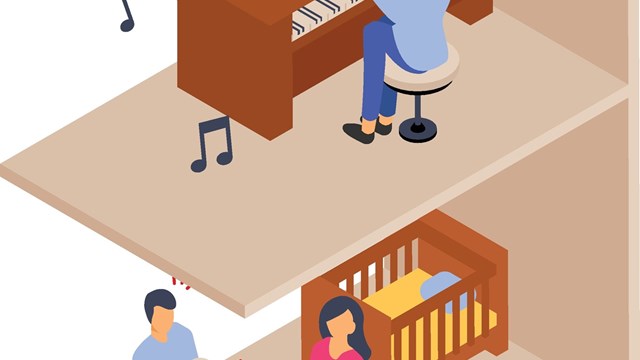
Over the past few months there have been several interesting and insightful court decisions. Here are a few legal cases that provide some helpful lessons.
Vassi v. Salem House Condo Bd.
Lesson: Condo boards need to make sure they have authority to enter into rooftop antenna contracts without unit owner approval before doing so.
The board of managers of a condominium located in New York County, entered into a contract for T-Mobile to place a cellular antenna on the roof of the condominium building. The board entered the agreement and T-Mobile proceeded with $270,000 in construction work on the common element roof. The board did not seek prior unit owner approval and the plaintiff unit owners sued to stop the completion of the work. The Supreme Court granted a restraining order temporarily stopping the work, but after a full briefing and argument, decided that there were no grounds to stop the work.
There were several interesting points made by the court in the decision, but the most significant was that the board did not have to go to the unit owners first for approval. If the plaintiffs had prevailed, however, the board would have been exposed to a breach of contract claim by T-Mobile which could have resulted in a recovery of at least $270,000 in damages. Before entering into these types of contracts, boards need to make absolutely sure that they have authority to lease out common element roof without first seeking unit owner approval. Otherwise the condo can be exposed to suit such as this one and possible significant damage exposure.
The Salem House Condo’s Declaration states that “No person shall use or enjoy the general common elements except in accordance with the reasonable purposes for which they are intended and without encroaching on the rights of other persons to do so.” The declaration also provides that the roof is a common element. The court held that the declaration language did not “state with enough specificity what type of uses interfere with use and enjoyment. Is it a slight use which does not substantially interfere with plaintiffs’ use and enjoyment or does it bar complete or near complete activities on the roof? Such restrictions on the use of land must be supported by clear and convincing evidence.” Further, the Salem House condo’s bylaws provide that the “board or managing agent may curtail or relocate any portion of the common elements devoted to storage, recreation or service purposes in the building.” The court held that by their terms, the bylaws supersede the declaration provision. If the declaration and bylaws provided otherwise or if the facts presented by plaintiffs were different, the court may have decided the case differently.
61 West 62 Owners Corp. v. CGM EMP LLC
Lesson: Noisy rooftop establishments can be a nuisance, and co-ops and condos are placed in a good position by this decision.
Defendants operated a bar on the rooftop of a 12-story building adjacent to the co-op building at 61 West 62nd Street in New York City. The bar played music until 3 a.m. The co-op sued arguing that the bar operator caused a nuisance and asked the court to stop the congregation of persons in non– enclosed areas on the rooftop as well as emanating of the noise at unlawfully loud levels in violation of the New York City Noise Control Code. As an alternative, the co-op also sought monetary damages.
The co-op retained an acoustic engineer whose measurements showed that the noise in an apartment from the outside music was 100 times more intense than the legal limit. New York City however, had never issued a violation to the bar for the noise.
The Appellate Court in Manhattan held that the absence of a New York City violation was “wholly immaterial” to a common law nuisance claim. One judge of the four judge appeal panel wrote a dissenting opinion arguing that a violation is a predicate to a nuisance claim. The co-op counsel could not explain why the bar’s habitual violations of New York City Noise Code were not brought to the attention of the New York City Department of Environmental Protection (DEP) which the dissenting judge thought “possesses ample power to redress the grievance including the imposition of substantial civil penalties…, the issuance of cease and desist orders …and the sealing of offending sound equipment.” The dissenting judge also suggested the co-op could enlist the offices of the New York State Liquor Authority which could suspend a liquor license based on the excessive noise.
Despite the dissent’s points, a majority of the appeal court sent the case to the Supreme Court to decide what to do for the co-op about the noisy bar.
Judy Cukier Siegler and Scott Siegler v. 875 Tenant Corp.
Lesson: Make sure your Alteration Agreement has a thorough Professional Fee Provision.
This case involved a dispute between the cooperative corporation and a shareholder over an apartment combination alteration. There was stop work direction by the cooperative and eventually that direction was resolved and the alteration was completed. The significance of the court decision is the discussion on the legal fee reimbursement claims. Each party argued that they were entitled to a reimbursement of legal fees under a typical proprietary lease provision. The court held that the cooperative did not breach the proprietary lease by stopping the work during the alteration. Likewise, the court held that although the shareholder did not adhere to the house rules with respect to floor covering and sound abatement, the cooperative approved the plans so there was no breach.
The court did not discuss any legal fee provision in an alteration agreement. If
the provisions of the alteration agreement were drafted with broad coverage, it
is possible that the court may have decided the attorney fee reimbursement
policy differently and in favor of the cooperative. It is important for co-ops and condos to evaluate their alteration agreements.
Saul Sayeh vs. 66 Madison Avenue Apt. Corp
Lesson: Co-op Boards should be aware of what constitutes discrimination in transfer decisions so that they can avoid it.
In this matter, the cooperative refused to consent to a purchase by an Israeli. The buyer sued for discrimination based on national origin. The case was dismissed as there was no evidence that the board treated non-Israelis differently. Nor was there any evidence that the co-op board based its decision on the basis of the purchaser's national origin. The court explained that to make out a case for housing discrimination under the applicable federal and state statutes, the plaintiff must establish (1) that he is a member of a class protected by the statute, (2) that he sought and was qualified to purchase the apartment, (3) that he was rejected, and (4) that the co-op's denial of plaintiff's application occurred under circumstances giving rise to an inference of discrimination. Boards should keep this standard in mind in making their decisions.
Helen Skouras v. Victoria
Hall Condominium
Lesson: The Business Judgment Rule is a Great Defense
A unit owner in the Victoria Hall Condominium in Queens sued the board claiming that it breached its fiduciary duty by implementing a parking rule and revoking her parking privileges for failure to pay certain special assessments that were imposed. The condo board directed that her car be booted. The court threw the case out, holding that the business judgment rule applies because “’absent claims of fraud, self-dealing, unconscionability or other misconduct, the court should apply the business judgment rule and should limit its inquiry to whether the action was authorized and whether it was taken in good faith and in furtherance of the legitimate interests of the condominium.” The court held the business judgment rule applies and the case should be dismissed.
Crp/ Extell Parcell I v. Cuomo
Lesson: The offering plan can be a valuable source for information and argument.
An experienced co-op/condo attorney will often look to a co-op/condo’s offering plan in giving legal advice. Others stop at the declaration and bylaws of a condo, or proprietary lease and bylaws of a co-op. In this case, the sponsor of the condominium may have made a typographical error in the offering plan that buyers were relying on in order to get out of their purchase agreements. The offering plan provision said that buyers could back out of the agreement and get their good faith deposit back if the first unit closing did not occur before a certain date which the sponsors argued was incorrect.
The federal lower and appeal courts did not grant an injunction to the sponsors which would have stopped the required refund of sixteen million dollars in buyer deposits.
The offering plan is an important document that contains informative and possibly case dispositive information. Condo and co-op boards should not overlook the importance of the offering plan. In many buildings, sponsors continue ownership of units and in dealing with sponsor issues the offering plan provisions cannot be ignored.
Joseph G. Colbert is a partner with Kagan Lubic Lepper Lewis Gold & Colbert, LLP, specializing in the representation of cooperatives and condominiums.






Comments
Leave a Comment